As adjournment draws
near, lawmakers pick up the pace
Advocates for Minnesotans with disabilities are in the home stretch of the 2024 legislative session, as an adjournment date of May 20 is coming up quickly. And while the status of some bills is clearer, there are many questions about what is to come. The Minnesota Consortium for Citizens with Disabilities (MNCCD) and other groups continue to meet and provide updates on legislation. One date everyone was eyeing was April 19, which marked a critical deadline for bills. That date was when any
proposals with fiscal notes attached needed to have been heard in committees in both the House and Senate. That hard deadline meant many measures with costs attached would be dropping off, and shelved until next year.
Sean Burke, who leads lobbying efforts for MNCCD, noted that after the Passover break of April 22-23, state lawmakers would delve into the process of preparing larger omnibus bills. That is after this issue of Access Press went to press.
SESSION To page 5

A snapshot of health Page 3
A crisis in transportation Page 2
Protect group homes Page 4
Voting rights eyed Page 8
CILs need input Page 11
Award winners
Page 6


Those who live with limb loss hope for improved coverage
By Margie O’Loughlin
More than 35,000 Minnesotans are living with limb loss, and thousands more are living with limb difference and mobility impairments. Many are unable to access prescribed orthotic and prosthetic care due to a lack of insurance coverage, forcing individuals and families to incur huge out-of-pocket costs.
Some of their stories were shared at the state capitol this spring at a day-long event, called “So Every BODY can Move Minnesota.” It drew more than 100 advocates for two bills affecting people with limb loss and limb difference.
The goal of the two bills is to change the climate of insurance denials for orthotics and prosthetics prescribed by physicians for the health of their patients.
Seven other states are introducing similar legislation for fair insurance compensation this year, and five others passed similar legislation in 2022 and 2023.
Not medically necessary
Elsa Keeler is a retired pediatrician. Five years ago, she was diagnosed with a rare form of bone cancer that required a full leg amputation. She received a prosthetic leg with a microprocessor knee, which was expected to last five years. Keeler is an active outdoors-person who loves to paddle in remote places like the Boundary Waters Canoe area. Her first prosthesis began to wear out after three and one-half years.
When her doctor wrote a prescription for a replacement with a waterproof microprocessor knee, the claim was denied as “not medically necessary.”
These are three words that every person
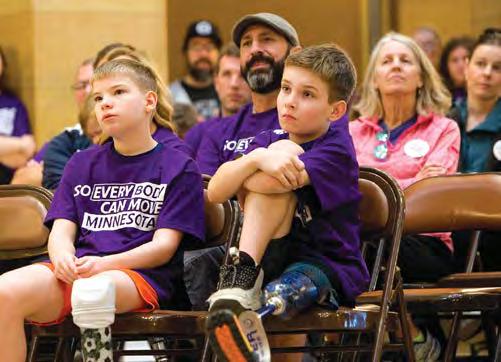
living with limb loss or limb difference quickly learns to dread. Being denied an orthotic or prosthetic device prescribed by one’s physician brings a range of feelings including frustration, disappointment, shame, and anger.
Like many advocates throughout the day, Keeler told stories about non-disabled relatives who received hip and knee replacements routinely so they could maintain their previous lifestyles. Artificial
hips and knees are internal prosthetic devices. Keeler said, “People needing external orthotic and prosthetic devices should have those same privileges, too.”
Bills receive bipartisan support
Limb loss can affect anyone at any time. It’s estimated that about 500 Americans lose a limb every day. Sen. Karin Housely (R-Stillwater) co-authored the Senate bill,
NONPROFIT ORG. U.S. POSTAGE PAID TWIN CITIES, MN PERMIT NO. 4766 Volume 35, Number 5 WWW.ACCESSPRESS.ORG May 2024
LIMITS To page 3 MINNESOTA COUNCIL ON DISABILITY
MARGIE O'LOUGHLIN
COVERAGE To page 4 NEWS DIGEST
Children looked on during the capitol event.
feted
This was a key message at the recent Disability Advocacy Day at the capitol.

When it comes to transportation and disabilities, we can’t get there from here
July 1 is a date the disability community will watch very closely. That is when rideshare companies including Uber and Lyft say they will end service to Minneapolis.
A dispute over rideshare driver pay has dragged on. It was the subject of vetoed state legislation in 2023. In March the Minneapolis City Council approved an ordinance to increase driver pay. While the intent is to ensure that rideshare drivers are paid at least as much as is required under the city’s minimum wage policy, the loss of a transportation resource is prompting great worry.
Many people with disabilities rely on Uber and Lyft. It will be a huge disruption for us and for elders, businesses, visitors and the hospitality industry.
The start date for higher pay was May 1 but the council kicked the can down the road in mid-April. That is seen as giving more time for new rideshare companies to emerge. The major transportation network companies will still be gone.
Mayor Jacob Frey, who opposes the original rideshare ordinance, said a delay is not a fix. We agree with him. We’re very skeptical that viable alternatives will be found by July 1.
We certainly appreciate the concerns about driver pay. We in the disability community know all too well what happens when workers are not paid enough. (Let us tell you about a little issue called the direct support staffing crisis.)
But Uber and Lyft can’t have it both ways. The companies, which now are marketing themselves as an option for disabled Twin Citians, aren’t a transportation option for many of us.
Why? Uber and Lyft contend that because

Many disabled Minnesotans have similar stories. It's especially dire in Greater Minnesota, where shortstaffed companies cannot begin to meet the demand for rides for people with disabilities and elders.
they are technology-based and are not comparable to taxi services, they don’t have to provide accessible vehicles under the federal Americans with Disabilities Act (ADA). Taxi companies must provide vehicles accessible to passengers with a wheelchair or scooters can access.
Minnesota lawmakers have yet to pass legislation that requires Uber, Lyft and their counterparts to do that.
Disability community members have been refused rideshare service because drivers say it’s too hard to even fold up a walker or wheelchair. Disability community riders have been refused rides because drivers refuse to accommodate service dogs.
Bringing in new companies by July 1 isn’t likely to make the situation any better. Those companies will likely claim that they also don’t have to meet ADA requirements. Until a state law is passed mandating that all rideshare companies provide wheelchair-accessible vehicles, the July 1
HISTORY NOTE
delay is meaningless. Until something is done statewide about driver discrimination against people with disabilities, the Minneapolis City Council and its actions are a joke.
There is a bigger and more insidious, overarching issue that must be considered. Throughout Minnesota and the nation, the transportation system for people with disabilities and elders is collapsing. It is an unsustainable mix of staffing shortages, rising costs and demand for service exceeding supply.
And that is frightening.
Advocating for improvements is necessary yet complex. Whom a disability advocate speaks to depends on where they live, where they travel to and how a serviced is provided. It can be daunting to figure out where to make comments heard.
Those of us in the core cities fondly remember when we had many more local taxi companies. Many closed in the face of rideshare companies. The few remaining companies
sometimes don’t have enough drivers.
Why not use paratransit? Riders have experienced less than reliable service. That in turn has affected their employment, and their ability to be part of their home communities.
Why not take regular transit? Too many transit service providers are short-staffed. Not every bus route is reliable and on time. Light rail trains can be an unnerving if not frightening experience at times, with open drug use and criminal behaviors.
A woman with disabilities we know told us how she had to turn down a great job. She wasn’t physically able to do a 1 ½ hour bus ride, with two transfers, to and from work every day. She did not have good experience with her area’s paratransit.
She has used rideshare services but cannot afford those all of the time. So she turned down a great job. Instead she stocks shelves and picks up as much overtime as she can to cover basic bills.
Many disabled Minnesotans have similar stories. It’s especially dire in Greater Minnesota, where short-staffed companies cannot begin to meet the demand for rides for people with disabilities and elders.
So as we are literally and figuratively left at the curb, here’s our message to policymakers at all levels. Do better. Pass a law requiring wheelchair-accessible vehicles and then back it up with some financial support for rideshare companies.
To city officials: Consider the consequences of your actions.
To the rideshare companies and all other service providers? Do better. Accommodate us. Get some accessible vehicles. Educate drivers about our needs.
Do better. Do something.
It was a long and bumpy journey for paratransit services to
How we people with disabilities get around is not a new issue.
Fifty years ago, the Minnesota Legislature ordered that transit service be provided for people with disabilities. State lawmakers in 1974 added four-hundredths of one mill to metropolitan area property tax bills to fund the program. The tax was expected to generate $240,000, which would be matched with $150,000 in federal dollars.
State lawmakers had heard from many disabled constituents, who needed viable paratransit options. Buses were not accessible to everyone.
Mandating accessible transit or paratransit was one thing. Providing it would be quite another. The task of setting up service in the Twin Cities was placed in the hands of the Metropolitan Transit Commission (MTC). The MTC in turn set up a steering committee, the Metropolitan Transit Committee for the Disabled, to study paratransit issues.
“Transit for handicapped may be available soon” was a headline in the October 25, 1974
Star Tribune. The article noted that personal transit service could be provided to some disabled Minneapolis and Robbinsdale residents before Christmas.
The MTC planned to purchase special vans or small buses that were accessible to people with disabilities. “Drivers will receive physical, psychological and sensitivity training,” the article stated.
The initial idea was that service was to be tailored to riders’ individual destinations, with some rides available through an on-demand, dial-a-ride service. Other rides would have to be reserved at last 24 hours in advances.
Fares were to be the same as those under the MTC zone system, with a base of 30 cents. The zone system meant varying fees were paid, set by length of ride.
Deciding where the paratransit vehicles would operate provide to be controversial among the project’s 17-member steering committee. The project was to serve a small area, of potentially 13 miles in diameter.
Service to Minneapolis’ North Side was
initially rejected as it was felt there would not be enough disabled riders there. Serving south and central areas of Minneapolis was set aside because a second experimental diala-ride service was to start there. That service, led by the nonprofit Model Cities, would serve an array of riders – not just riders with disabilities. (The Model Cities service ended in 1975 due to high costs.)
Eventually the steering committee decided to serve part of Robbinsdale and North Minneapolis, as well as the Loring Park neighborhood of south Minneapolis. But the service didn’t meet its Christmas 1974 deadline. It took months longer than expected to seek bids and then order vehicles.
The chosen vehicles would have 10 seats and space for up to three wheelchair users. Vehicles were to have either lifts or ramps. Riders were expected to get from their homes to the curb for pickup.
The delays in starting the program frustrated people with disabilities. At its 1975 convention at Minneapolis South High

School,l the United Handicapped Federation objected to the delays and demanded action. MTC Chairman Doug Kelm promised the group that service would start soon.
Kelm also noted that MTC had recently lowered bus fares by half for disabled riders. But that too had been controversial. Some blind advocates said they didn’t want special treatment. Other disability advocates said a half-fare was not still too much.
“Project Mobility” finally started in 1976 and provided several hundred rides to people who otherwise could not use fixed route service in the city of Minneapolis. In 1979, Project Mobility became Metro Mobility and expanded from Minneapolis to St. Paul and surrounding first ring suburbs.
The History Note is a monthly column produced in cooperation with the Minnesota Governor’s Council on Developmental Disabilities. Past History Notes and other disability history may be found at www.mnddc.org
MAY 2024 Volume 35, Number 5 Pg 2
get started
EDITORIAL: Editorial submissions and news releases on topics of interest to persons with disabilities, or persons serving those with disabilities, are welcomed. We reserve the right to edit all submissions. Editorial material and advertising do not necessarily reflect the view of the editor/publisher of Access Press. DEADLINE: 15th of each month. CIRCULATION/DISTRIBUTION: Distributed the 1st of each month through more than 200 locations statewide. Approximately 750 copies are mailed to individuals, including political, business, institutional and civic leaders. SUBSCRIPTION: Free and accessible to anyone in MInnesota, visit www.accesspress.org to subscribe. ABOUT ACCESS PRESS: A monthly newspaper published for persons with disabilities by Access Press, Ltd. POSTMASTER: Send address changes to Access Press, PO Box 40006, Industrial Station, St. Paul, MN 55104-8006 INQUIRIES AND ADDRESS CHANGES should be directed to: Access Press, PO Box 40006, Industrial Station, St. Paul, MN 55104-8006; 651-644-2133; email: access@accesspress.org Website: accesspress.org Editor ............................................................................................................................................................................................ Jane McClure Board of Directors Tim S. Benjamin, Mark Daly, Brendan Downes, Catherine Hunter, ................................................. Jane Larson (Chair), Brandon Miller, Lynda Milne, Manley Olson, John Tschida, Kay Willshire Business Operations and Advertising Manager Mary Graba Advertising Sales .......................................................................................................................................................... Katarina Mulheran Production In-Fin Tuan Digital Production Tricia Donovan, Scott Stadum Website: accesspress.org email: access@accesspress.org phone: 651-644-2133 Co-Founder/Publisher Wm. A. Smith, Jr. (1990-96) Co-Founder/Publisher/ Editor-in-Chief Charles F. Smith (1990-2001) Editor-in-Chief/Executive Director Tim Benjamin (2001-2020)
EDITORIAL
Stay updated on COVID-19 vaccines, take advantage of telehealth
When was your last COVID-19 vaccine?
When should you get another?
Adults ages 65 years and older should receive an additional updated 2023-2024 COVID-19 vaccine dose, according to the federal Centers of Disease Control and Prevention (CDC). The recommendation acknowledges the increased risk of severe disease from COVID-19 in older adults, along with the currently available data on vaccine effectiveness.
Previous CDC recommendations ensured that people who are immunocompromised are already eligible for additional doses of the COVID-19 vaccine. Many people with disabilities have compromised immune systems.
CDC Director Mandy Cohen has endorsed the CDC Advisory Committee on Immunization Practices’ recommendation for the vaccine. Data continues to show the importance of vaccination to protect those most at risk for severe outcomes of COVID-19. An additional dose of the updated COVID-19 vaccine may restore protection that has waned since a fall vaccine dose, providing increased protection to adults ages 65 years and older.
Adults 65 years and older are disproportionately impacted by COVID-19,

with more than half of COVID-19 hospitalizations during October 2023 to December 2023 occurring in this age group.
The CDC and the committee will continue to monitor COVID-19 vaccine safety and effectiveness. CDC continues to recommend that everyone stay up to date on their
First statewide post-pandemic health assessment is released
The Minnesota Department of Health (MDH), in collaboration with the Healthy Minnesota Partnership, has published the Minnesota Statewide Health Assessment. The assessment report provides a snapshot of health in Minnesota.
It focuses on how different factors impact health, including the environment, education, housing, transportation, social circles and more. It compiles and uses data and information from more than 400 data sources and scientific literature.
The assessment shows that Minnesota’s health is positively impacted by things like access to nature, good health care facilities and strong civic participation. But even within these areas inequities persist. Not every community has the same opportunities to be healthy.
The assessment is also one of the first statewide health assessments in the nation that was completed after the COVID-19 pandemic. While COVID-19 is not the main focus, the assessment does include some data about COVID-19. It acknowledges that COVID-19 had a significant impact on health.
It notes that COVID-19 was the third leading cause of death in Minnesota in both 2020 and 2021. In 2020, it accounted for 10 percent of all deaths, behind heart disease (16 percent) and cancer (19 percent).
Before vaccines and treatments were developed, during the fall surge in 2020, a smaller number of infections caused a much higher rate of hospitalization and death in Minnesota, according to the assessment. As vaccines and treatments became widely available, hospitalization and death rates declined sharply during the surge in cases between fall 2021 and early spring 2022, highlighting the value of vaccination and treatments in preventing severe illness. One of the outcomes of the pandemic was that people ages 65 and older who were vaccinated were much less likely to be hospitalized or die compared to people who were not vaccinated. The risk of hospitalization and death was reduced even more for people ages 65 and older who stayed up to date on their vaccines by receiving the regularly recommended doses.
“The pandemic shed light on underlying issues that we’ve known about for a long time including the need to effectively communicate the importance of actions like vaccination, finding ways to collect better and more timely data, and continuing to address health and racial inequities,” said Minnesota Commissioner of Health Dr. Brooke Cunningham.
“Minnesota is a place that values health, opportunity, belonging and nature, and this statewide health assessment shows that,” said Cunningham. “But we know it’s not just the presence or absence of disease or injury that defines health. The places we live and the environment around us play a role as well, and we can see in the data that it's
easier for some groups and communities to be healthier than others.”
The Healthy Minnesota Partnership, a collaboration of MDH and community partners, will use the assessment, done every five years, to create a statewide health improvement framework, set priorities and make recommendations.
“This assessment helps update the roadmap we’re using to inform our work and address these disparities in data and community-driven ways,” said Cunningham. “Working together, change is possible. We have a lot of great momentum coming out of a historic legislative session in 2023 and a shared goal with the rest of the Walz-Flanagan administration to make Minnesota the best state for children and families.”
As part of the assessment, the Healthy Minnesota Partnership also surveyed Minnesotans to learn about state strengths that support health. Other assessment activities included a community engagement inventory, group conversations and public comment.
“Everyone in Minnesota can use the assessment to support their communities’ health improvement efforts through planning, organizing, working on statewide actions and more,” said Sarah Grosshuesch, co-chair of the Healthy Minnesota Partnership and public health director at Wright County.
She also added that the assessment is meant to inspire action across different sectors, agencies and community organizations. The assessment calls for a health-in-all-policies approach and includes policy profiles about paid family and medical leave, tree canopy cover and broadband Internet access.
The Healthy Minnesota Partnership is expected to release its framework for action and recommendations based on the assessment in late 2024.
To read the full assessment, go to https:// www.health.state.mn.us/communities/practice/ healthymnpartnership/sha.html
COVID-19 vaccines, especially people with weakened immune systems. Cohen said, “Most COVID-19 deaths and hospitalizations last year were among people 65 years and older. An additional vaccine dose can provide added protection that may have decreased over time for those at highest risk.”
From page 1
staff report also notes that: “Banks and pharmacies provide valued services to St. Paul residents in addition to employment and tax base benefits. Also, notably, pharmacies play an important role in public health.”
The proposed regulations focus more on specific areas and specific types of businesses
New drive-through services would be banned in the downtown central business district. In areas zoned for traditional neighborhoods use, including several arterial streets, drive-throughs would be limited to banks and pharmacies. These land uses are seen as more necessary than fast-food restaurants and coffee shops, and having fewer negative impacts. Also, restaurants and coffee shops can more easily offer curbside pickup.
Design requirements are also proposed,
Get help quickly
The landscape of COVID-19 has changed over time. Some health insurers are requiring co-pays for vaccines. Free tests are largely a thing of the past. But there are still free or low-cost resources.
State health officials work with Cue Health to provide faster access to Paxlovid in many cases. Paxlovid is an anti-viral treatment that can provide relief in many cases. Minnesota has a Test-to-Treat-Telehealth Program.
Because many people are not tasking advantage of updated vaccines that combat new variants, and because clinics are often crowded, the telehealth program is an option for people seeking treatment when they do become ill.
Paxlovid may not help everyone. It is typically only prescribed to adults. But it is very effective. One clinical trial found an 89 percent reduction in symptoms. But it and any other antiviral medications have a short window of time in which they can be used.
If someone is unable to pay for medication the PAXCESS Program can help. Learn more at https://www.paxlovid.com/paxcess
Learn more about telehealth and COVID-19 at https://care.cuehealth.com/mn
with additional motor vehicle waiting or “stacking” spaces shops and design of businesses’ pedestrian access in a way that shields pedestrians from crossing a drivethrough lane on foot or with a mobility device.
The Planning Commission will also be asked to prohibit drive-through lanes and their driveway access points in traditional neighborhoods district within 300 feet of transitway stations. Transitways include light rail, bus rapid transit, arterial bus rapid transit and modern streetcar, but not regular route bus lines.
Comments are being taken on the study. Go to https://www.stpaul.gov/departments/ planning-and-economic-development/planning/ current-activities and look for the zoning study. The city has posted a specific set of questions and answers, and also gives information on how to submit written or inperson testimony.





MAY 2024 Volume 35, Number 5 Pg 3
LIMITS
Transitional and Housing Services Independent Living Services ADA Minnesota Information COVID Community Coordination Advocacy & Referral Services Contact us today! 651-646-8342 www.mcil-mn.org Responsive PCA Choice Services Independent Living Services ADA Information & Referral Covid Community Coordination Transitional and Housing Services Contact us today! www.mcil-mn.org 530 North Robert Saint Paul, MN 55101 Live your most independent life, follow your path! Live your most independent life, follow your path!
Got news to share? Drop us a line or call 651-644-2133 access@accesspress.org
ISTOCK

Change is needed to prevent cities from forcing community-based housing out
by Josh Berg
For almost 10 years, disability advocates, myself included, have voiced concerns regarding cities arbitrarily applying municipal rental ordinances to communitybased settings. In 2024, we are finally seeing some progress on addressing these concerns, in large part to a bill authored by Representative Brion Curran (DFL- White Bear Lake), House File 3938, and Senator Liz Boldon (DFL- Rochester), Senate File 3839. At issue is whether cities should have the ability to arbitrarily apply more stringent standards to residential settings licensed by the Minnesota Departments of Health and/ or Human Services. In 2023, we saw news stories about cities revoking local rental licenses, and de facto evicting group homes from within their borders. These NIMBYdriven policies and practices prevent our fellow Minnesotans, including those with disabilities, from living in the communities they choose.
As a city council member in Elko New Market, an active member of the League of Minnesota Cities, and a member of the Board of Directors of Metro Cities, I suppose I should be defending cities and their ability to use tools like rental ordinances to regulate activity.
COVERAGE
From page 1
and met with advocates including several orthotics and prosthetics technology students from Century College, which is in her district.
The chief author of the Senate bill is Sen. John Hoffman (DFL-Champlain), whose daughter Hope Hoffman was born with spina bifida. Her neurological condition has required multiple surgeries and prosthetic devices. Along the way, her family has had to push back against insurance claim denials that added to the frustration of living with a congenital condition.
The pending bills ask that state insurance plans be required to provide coverage at a rate equal to the federal Medicare program. Insurance premiums across the board would only be expected to rise 39 cents per member per month, on average. Thirty nine cents per month would make it possible for amputees to receive a waterproof limb to use while showering, or optimize their
But as someone who has worked in disability services for years, is a leader within a St-Paulbased nonprofit providing affordable and accessible housing, and volunteers my time serving on ARRM’s Board of Directors, I know cities are on the wrong side of this issue, and I support HF3938/SF3839’s efforts to correct that. Cities contend that “local control” is critical to ensuring the livability and safety standards for communities, and rental licensing ordinances are designed to allow cities to quickly respond to and address issues. That may be true, but it is also true that there are countless safeguards and redundancies already in place to address these issues, through individual counties, state agencies, and the state fire code. In most circumstances, the standards and requirements imposed by state agencies are more comprehensive in addressing a wide array of issues than what local rental ordinances do. Local control, in this case, provides nothing other an opportunity for local governments to overrule the licensing procedures of state agencies and to discriminate on behalf of residents, often as a concession to NIMBYISM, who don’t want people with disabilities living in their neighborhoods.
ability to bike, run, swim or play any other ambulatory sport.
Movement is medicine
In the last activity of the day, coach Adam Warden of the non-profit Wiggle your Toes led a mobility clinic with games for children, and high-intensity exercises for participants of all ages.
According to data from the Amputee Coalition, half of adults with disabilities get absolutely no aerobic exercise, and children with disabilities are twice as likely to develop obesity as those without.
By contrast, people with disabilities who are physically active are more likely to be employed, advance in their careers, and have improved physical and mental health.
To learn more about the bills before Minnesota House and Senate, go to www. msopp-mn.com
A version of this story appeared in the TMC Publications, which are published in Minneapolis and St. Paul.
Thankfully, most cities already defer to the state and exempt residential settings from their rental housing ordinances, but not all. These bills are necessary because some cities insist on using rental ordinances to drive group homes out of their communities. In recent months, I’ve spoken with several council members, mayors, and staff from cities across the metro that exempt these settings from rental regulations, and when asked why their respective cities choose this approach, the resounding theme is “why would we waste valuable city resources to duplicate something the state and counties are already doing?”
HF3938/SF3839 is also about bringing stability and consistency to a vital support network that has been stretched thin in recent years. When residential settings run the risk of arbitrary “eviction” from local government, the mental and physical impact on those living and working there is too great for the Legislature to ignore. Consistency and fairness are important as well. Cities cannot explain why some cities allow a state-licensed home that serves primarily older adults to be exempt from obtaining a rental license/permit but a state-licensed home that provides supports to individuals with disabilities are required to. But we know why. Situations like this reek of
ableism and ageism, and the Legislature should step in and put these controversial and unfair practices to rest.
We also must look at issues elsewhere in the care profession and how they might be connected to this issue. We’ve all heard of the overcrowding issue in hospitals and emergency rooms. This specific issue has been brought up at the Acute Care Transitions Advisory Council as one of the several significant barriers to finding housing and supports for individuals stuck in hospitals. Discriminatory local ordinances contribute to this issue. Providers operating in cities that require a rental license/permit are often afraid to accept individuals with complex care needs, including mental health issues or severe behavioral challenges because they fear that the city could arbitrarily and capriciously revoke that license/permit if neighbors complain. This keeps people in hospitals instead of in communities that can care for them and support them.
The debate over HF3938/SF3839 boils down to “local government control” or “putting people first” and I hope we all agree that the latter is far more important.
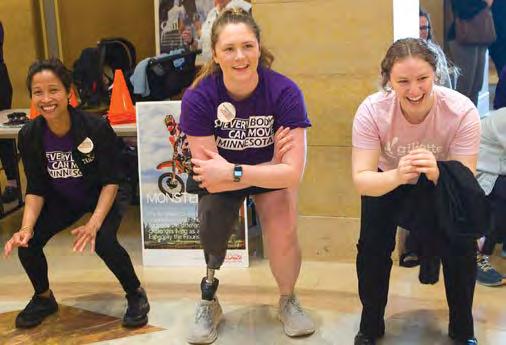




MAY 2024 Volume 35, Number 5 Pg 4 Access Press welcomes letters to the editor and commentary pieces from readers, on topics of interest to Minnesota’s disability community. Letters should be no more than 500 words, with 750 words per commentary. Ask the editors if more space is needed. Letters and guest commentaries must be signed by the author or authors. With letters, a writer’s hometown is published but not a street address. Please send contact information, in the form of a phone number or email, in case the editor has questions about a letter or commentary. Contact information isn’t published unless the writer specifically requests that the newspaper do so. Pictures of the author can be published with a guest commentary but aren’t required. Access Press asks that letters and guest commentaries be specifically written for the newspaper. Letters must have a focus on disability issues and ideally, a focus on those issues as they affect Minnesotans. Form letters will not be published. Because Access Press is a non-profit publication and must follow regulations on political partisanship, political endorsement letters are not published. That is true for candidates’ endorsements as well as for ballot questions. Before making a submission, writers are always encouraged to contact the newspaper to discuss ideas or to ask questions about From Our Community submissions, at 651-644-2133 or access@ accesspress.org. If accommodations are needed to submit a letter or commentary, a staff member will help you. Letters and commentaries reflect the view of the authors and not the views of the staff and board of directors of Access Press. Deadline for the print edition of the newspaper is the 15th of each month, with publication the following month. We welcome your letters and commentary; follow guidelines Kent Fordyce KENT’S ACCOUNTING SERVICE, LLC 612-889-2959 fordyce6@aol.com Fax: 952-472-1458 6371 Bartlett Blvd Mound, MN 55364 Certified ProAdvisor 2022 | 2005-2021
MARGIE O'LOUGHLIN
Participants at the rally enjoyed a series of exercises.
Fiscal and policy measures previously passed in committees get thrown into the hopper and combined into omnibus bills. That work began in late April, followed by the intensive work of conference committees and the work to prepare committee reports.
What comes out of the conference committees then heads to the floors of the House and Senate for consideration.
End to subminimum wage?
One of the most controversial issues that is moving ahead is that of eliminating subminimum wage. A 2021 legislative task force on eliminating subminimum wage recommended state lawmakers end the practice by August 1, 2025, with a phased implementation period.
The wage program allows employers to pay people with disabilities a low wage. It was set up in 1938 and was long seen as a way to provide a small amount of income to workers who otherwise would not be hired in the greater marketplace. It’s most often used by service providers in workshop-type settings, to provide or prepare goods for sale.
But with so much training and more supports available today, foes of subminimum wage say it devalues people and should be abolished. They say that advances in training and support services have made it possible for people with disabilities to pursue careers of their own choosing based on their skills and interests.
Supporters of eliminating subminimum waged contend that practice is unfair and must be banned. But others worry that
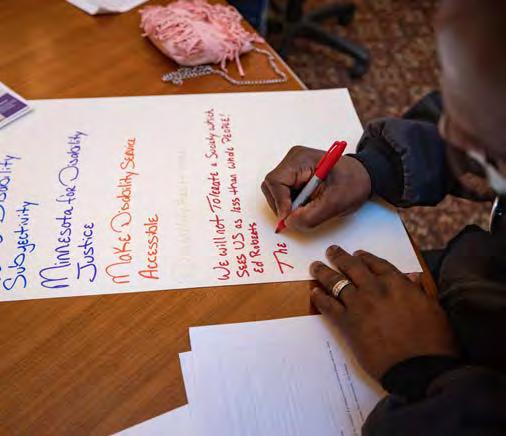
banning subminimum wages will eliminate jobs for some people with disabilities, especially those with limited skills. Qualified employers have been authorized to pay these workers less than the applicable minimum wage. These employers must hold what is known as a 14c waiver. About 50
employers in Minnesota have such waivers.
According to the Minnesota Coalition for Disability Wage Justice, the average Minnesotan under a 14c waiver makes $4.15 an hour. Some are paid much less. One report was that there is person paid 7 cents per hour, although that could not be verified
by Access Press.
On April 15, the House passed language to end subminimum wages, with the House version passing on a tight 69-62 vote. The Senate passed the measure earlier in April.
Here’s the proposal heading into omnibus bill time. The subminimum wage would be phased out, with employers would not be allowed to hire for less than minimum wage beginning August 1, 2026. Employers would have to pay all existing employees with disabilities the relevant minimum wage by August 1, 2028.
Efforts continue on other fronts to phase out the subminimum wages. In March, the University of Minnesota Institute on Community Integration completed a statewide training program to help eight Minnesota organizations transition away from special certificates that allowed them to pay workers with disabilities below the minimum wage.
The organizations can opt to continue to receive technical assistance from ICI as they work to implement the new service models, which involve training staff how to prepare people with disabilities for competitive integrated employment, said ICI’s Danielle Mahoehney.
“Different providers are at different stages in this process, but it’s gratifying to see progress from each of them in the kind of transformational change that is required to go from sheltered workshops to competitive jobs,” she said.
Organizations in the program can get help with training grants and move toward integrated employment.
As 2024 session winds down, disability measures are facing mixed fates
Setting the stage
What’s been a challenge this session is the caveat that advocates and their organizations do not make significant funding requests, especially since many either didn’t get fully funded in 2023.
One group calling attention to the funding crisis is the Mental Health Legislative Network, which held a press conference and call-in day focusing on children's mental health and the desperate need to add more funding to the proposed budget for health and human services. Sue Abderholden, executive director of NAMI Minnesota said, “I want to be clear, that this press conference isn’t about providing money to providers. It is about children and their families. It is about the negative impact low rates have on our children accessing mental health care. It is about children waiting months to access therapy. It is about children boarding in emergency rooms. It is about waiting lists for residential in months not weeks. It is about our children in despair, without hope.”
The stage for change began to be set April 15 when the House Human Services Policy Committee passed the Human Services Policy Bill. Although not every measure sought was included, many aspects of the bill were hailed by Minnesotans with disabilities and their allies.
Rep Peter Fisher (DFL-Maplewood) chairs the committee. “The most vulnerable Minnesotans need someone in their corner and last session we addressed issues impacting those most at risk across the state. This policy bill clarifies, changes, and improves several items in last year’s bill to address concerns from the disability community and others,” he said. “We continue to make tangible progress for Minnesotans with disabilities, those in recovery from substance use disorder, recipients who rely on our waiver services to help them thrive, and more.”
Several measures moved ahead. Community residential settings serving up to six individuals would be exempt from rental licensing regulations imposed by any town, municipality or county. This is seen as a way of keeping local governments from forcing the facilities to shut down. (See commentary on page four.)
Individuals in assisted living facilities are now counseled on long-term care options so they may make informed choices. The bill would expand that provision to individuals across all critical care spectrums. The bill would also provide for continuity of care for seniors receiving personal assistance and transitioning onto the medical assistance elderly waiver program. Another change would affect the state’s
Commission of the Deaf, DeafBlind, & Hard of Hearing by increasing the number of at-large members from seven to 10. Voting members could not serve more than three consecutive full terms. The bill would limit advisory committee members to three consecutive terms and no more than nine years in total.
The bill would also reduce the burden for those receiving Medical Assistance for Employed Persons with Disabilities (MAEPD) by requiring recipients to qualify once each year. People in the program must qualify twice each year.
But an effort to eliminate premiums for MA-EPD participants is up in the air. There is an effort to provide a short-term solution, meaning that people on MA-EPD could not be removed from the program if they cannot pay their premiums. But the total elimination of premiums may have to wait until 2025.
The House Human Services Finance Committee approved a supplement budget April 18 and sent it on to Ways and Means Committee.
Sponsored by Rep. Mohamud Noor (DFLMinneapolis), the bill would appropriate $42.13 million in fiscal year 2025 and $14.86 million in the 2026-27 biennium to the Human Services and Corrections departments for myriad disability services, aging services, substance use disorder services, civil commitment matters, and direct care and treatment services.
“We’re never done until the end, so we’ve got some more work to do,” Noor said. “We’ve done an amazing job, a transformative job … and this will be an ongoing conversation.”
The biggest appropriations in the bill are $7.18 million in fiscal year 2025 and $13.22 million in the 2026-27 biennium for forensic services or specialized mental health treatment for patients who have been charged with a crime and are civilly committed as mentally ill and dangerous.
The expansion of a nursing home loan program would receive $7.69 million in fiscal year 2025.
A new program to pay parents and spouses for serving as personal care assistants for their loved ones who require physical assistance with daily living activities would receive $4.83 million in fiscal year 2025. The Minnesota program was approved by the federal Centers for Medicare and Medicaid, Noor said.
The Department of Human Services is trying to roll out the program smoothly so that it may commence in June, said Kristy Graume, the department’s director of legislative and external affairs for behavioral health, disability services, and housing.
The bill would appropriate $1.65 million in fiscal year 2025 and $4.29 million in the 2026-27 biennium for a new program to help individuals eligible for medical assistance to enroll prior to re-entering their community after serving time in a correctional facility.
Transportation network companies update
The Minnesota Council on Disability has put a strong effort into law changes affecting transportation network companies (TNC) and worked on a compromise bill. That bill currently includes wheelchair accessible vehicle (WAV) pay incentives for drivers. But it looks like an ask for a study or grant program for WAVs has stalled this session as there isn’t an attached fiscal note.
Much is in the mix, with Minneapolis city leaders postponing increased TNC wage requirements until July 1. Lyft and Uber, the largest service providers, are still planning to leave Minneapolis then. The change was to take effect May 1 but was postponed to seek time to find new service providers.
Minnesota RISE Act
The Minnesota RISE Act has been moving ahead. The act would provide comprehensive support and accommodations within higher education institutions for students with disabilities. As Access Press went to press, it was part of the higher education policy omnibus bill.
Episodic disabilities eyed
An amendment to the state human rights act is proposed, which would align state protections for episodic disabilities with
federal standards. Episodic disabilities are those that come and go, such as recurring cancer, epilepsy, diabetes and psychiatric disorders. People with these types of disabilities have often struggled to gain equal rights, as well as needed supports and services.
As April ended the change was in the in the Human Rights Department policy omnibus bill.
Another amendment to the state act would make changes to the definition of a service animal. It would be more inclusive of the types of disabilities where a service animal is needed, and would expand the types of animals that can legally be considered service animals.
So what’s next?
Many committees held their final meetings the third week of April, marking up, debating and voting on comprehensive supplemental budget bills in advance of the April 19 final deadline for those bills to have had favorable action taken on them in order to proceed.
That deadline does not apply to the taxes, bonding or ways and means committees. The work of those committees and several efforts to aid Minnesotans with disabilities will take center stage in the weeks to come as changes are made and a capital investment bill is likely assembled and debated.
This article was prepared with information from MNCCD, the Minnesota Council on Disability, NAMI Minnesota and Session Daily.



MAY 2024 Volume 35, Number 5 Pg 5 • • • • • • • • • • • • • • • • • • • • • •
SESSION
page 1
From
MINNESOTA
COUNCIL ON DISABILITY
Rally days are a great place to get a message across.
Day and employment service providers win 2024 MOHR Choice awards
Six organizations that go above and beyond in providing services to Minnesotans with disabilities are being honored by the Minnesota Organization for Habilitation and Rehabilitation (MOHR).
The six are recipients of the annual MOHR Choice Award recipients. The honorees are chosen from large and small day and employment services organizations from all corners of the state. The commonality is that they have all created exceptional programs which ensure that people with intellectual and developmental disabilities are uplifted, celebrated and given the opportunity to use their skills to add value to their communities.
“Every year, the Choice Awards highlight exceptional programs offered by MOHR members,” said Robin Harkonen, president of MOHR. “The programs are truly lifeenriching for the individuals who participate in them.”
This year’s winners include businesses operated by people with disabilities, programs designed to break down barriers to disability employment, opportunities for people with disabilities to learn non-traditional skills, and initiatives that foster community engagement through the arts.
The winners are:
Udac, Duluth—Exploring Community and Careers
The Exploring Community and Careers program focuses on expanding opportunities for individuals with disabilities and advancing inclusive opportunities in employment practices, opening doors to roles and jobs that have not been previously considered for individuals with disabilities. Individuals with disabilities are given handson experiences to develop knowledge of roles and jobs within a wide variety of businesses. Meanwhile, businesses that participate in Exploring Community and Careers are engaged in seeing people with disabilities as part of their organization, becoming more familiar with them, and often more willing to hire them to become part of their workforce. The partnership involves the Duluth Area Chamber of Commerce, the school system and 11 diverse local businesses including Jamar Company, Essentia Health, YMCA, SCS Interiors, Duluth International Airport, Lake Superior College Aviation, Grandma’s, Krause Anderson, Duluth Entertainment & Convention Center, Duluth Area Chamber of Commerce, University of Minnesota Duluth and the Duluth Transit Authority. Since 2022, the program has been offered three times, serving 19 individuals.
Hubbard County Developmental Achievement Center, Park Rapids -The Depot and Heartland Art Studio
The Depot program focuses on teaching individuals with disabilities skills that they have previously been told were too dangerous. The program starts with basic tools like hammers and screwdrivers and works up to woodworking with table saws, grinding equipment, sanding equipment and more. It also includes basic car repair like oil changes, checking fluids, and tire rotations; a welding program that starts with basic skills and works up to welding for repair and artistic creation, gardening, and basic animal care with chickens. In the future, the Depot will also work on a community project with Hubbard County Soil and Water to create a food forest that will become a park for the community, and a pollinator garden.
Itasca Life Options, Grand RapidsDragonfly Coffee
Dragonfly Coffee is a social enterprise created by Itasca Life Options to provide empowering inclusion and community through the employment of adults with intellectual and developmental disabilities. The program provides paid pre- vocational job training as well as a sense of community and pride for the individuals served by Itasca Life Options. While some individuals may never have the opportunity to hold a job in the greater community, Dragonfly Coffee strives to find a spot for each person. To date, 20 individuals have been employed by Dragonfly Coffee, discovering and strengthening their skills in customer service, baking and barista work.
Rise, Coon Rapids-Rise with Y
The Rise with the Y program was born from an idea to connect YMCA members with the individuals with disabilities served by Rise at the YMCA to increase social connectedness, creating a higher quality of life, and therefore improved health outcomes. It began in the fall of 2023 and is focused on three pillars: Visibility, Variety and Connection.
The program initially began with lobby mixers, allowing both groups to meet each other. People began talking about life enrichment activities along with opportunities to connect. Since then, Rise has held many activities with members, including YMCA sponsored fitness classes, social events, arts and cultural programs, volunteering opportunities, community outings, and special events including a holiday party lunch. Rise regularly serves 30 people through its YMCA Life Enrichment Program. The events and activities also drew more than 40 YMCA members.
Additionally, after learning more about the program, 42 YMCA members signed up to connect with the Life Enrichment Program through special group activities like Zumba, coloring club, music therapy and community outings to places like the Pavek Museum of Electronic Communication and a bottling tour of Blue Sun Soda.
Options, Inc., Big Lake – Blackbird Coffee Company
Blackbird Coffee Company, owned, operated, and powered by Options, Inc., operates a coffee kiosk in the main lobby of Sherburne County Government Center in Elk River. The company was created to help people with disabilities develop and enrich valuable work skills including customer service, operating a point of sale system and creating custom drinks.
People served by Options, Inc. operate the kiosk every step of the way, from taking in-person and online orders to making the drink. Behind the scenes, they process orders, manage inventory and sales, and ship bulk coffee, t-shirts and mugs. The kiosk opened for business on May 1, 2023 and has seen a steady following from customers ever since.
PAI , White Bear Lake - Community Engagement and Inclusivity through Performing Arts
In 2023, Lakeshore Players Theatre connected with PAI to provide sensory and employment tours of their home venue, the Hanifl Performing Arts Center in White Bear Lake. This provided a unique opportunity for PAI program participants.
The Lakeshore Players also produced a short play in March, featuring participants from PAI.
The tours were a regular occurrence throughout last fall, and play practices are being held twice a week until the date of the show. Lakeshore Players also partnered with PAI's employment placement team to facilitate a job tryout. The tours, play and employment connections all boost confidence, increase skills, foster community inclusion and provide an opportunity for meaningful employment for community members with disabilities.

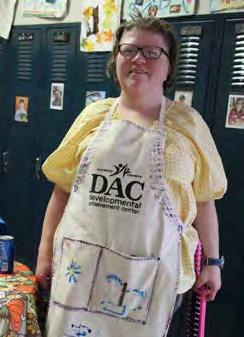









MAY 2024 Volume 35, Number 5 Pg 6
PEOPLE & PLACES
PAI www.accessiblespace.org Accessible, Affordable Housing Call 800-466-7722 TTY/TDD 800-627-3529 For adults with qualifying disabilities. Over 50 barrier-free apartment communities & homes throughout the Metropolitan Area, Greater Minnesota & throughout the Midwest. Locations also available in many other states. Income limits apply. Immediate openings in Hibbing, MN!
Affordable Senior Apartments
Immediate
Housing with Care* * 24-hour Assisted Living Services * Adult Foster Care * Independent Living Services * Eligibility for or selection of ASI services is not requred to qualify for housing. ASI services are not available in all locations. CORPORATE ADULT LICENSE FOSTER WITH ASLEEP OVERNIGHT STAFFING AVAILABLE IMMEDIATELY IN METRO AREA Call Today! Dragonfly
Developmental Achievement Center Reach our valued readers! Contact Katarina Mulheran Ad Sales 651-644-2133 ext 2 katarinam@accesspress.org
For qualifying senior households age 62 or better. Metro & Greater MN locations available. Accessible apts, available for seniors in these locations. Income limits apply.
openings in Worthington and Albert Lea, Minnesota
Coffee
PEOPLE & PLACES
Gillette clinic project benefits from generous gift
Minneapolis resident Dean Steven Ross Phillips, who died in April 2021, gave a generous gift of almost $1 million to the Gillette Children’s Foundation with a gift of nearly $1 million. The gift, which was confirmed recently, will be used to help cover the costs of renovating the Gillette Children’s Hospital clinic in St. Paul. Phillips will be honored with a plaque in the renovated facility.
The Grand Rapids Herald and St. Paul Pioneer Press told Phillips’ story. He was living in Northeast Minneapolis at the time of his death and left no will. He was 68 years old.
An old envelope postmarked 2013 bore some cryptic notes indicating that Phillips might have named the Gillette Children’s Foundation as the beneficiary for his 401(k) account. A family member contacted Gillette in May 2021, and found that Phillips had inquired in 2016 about the procedure for naming Gillette as a beneficiary.
A coworker’s child had been treated at
LIFE Mower County gives awards
LIFE MOWER County honored several community partners at its recent annual meeting. It was the 72nd year for the meeting, which was held in Austin.
The nonprofit organization provides opportunities for people with intellectual and developmental disabilities
Several people and groups received 2024 awards. The Austin American Legion Post 91 is community partner of the Year. Vanessia
Gillette, said Leona Fitzmaurice, Phillips’ older sister.
Phillips’ heirs spent a year trying to determine his final wishes, even serving his former employer with a subpoena. They learned that the Gillette Children’s Foundation was his designated beneficiary.
Phillips was born on June 10, 1952, and grew up on 310 acres of mostly wild land in Splithand Township approximately 18 miles south of Grand Rapids. According to the Herald story, "he loved the outdoors, excelled in school, and demonstrated his artistic talents by creating unique sculptures during his early teens and then, in his later teens, designing and building cars. He attended Itasca Junior College (now Minnesota North College) where he developed an aptitude for welding, a skill that he practiced first in the shipyards of Duluth-Superior and then later in several small companies in the Twin Cities. He joined Caterpillar Paving Products,
Pettitt is direct service professional of the year. Professional of the year is Beth Tobak. Wendy Whalen is volunteer of the year. Josh Dibble was honored with the Robert Qual Memorial Self-Advocate of the Year award. The award is named in memory of Qual, who died in 2002. Qual was a longtime Austin business owner and community volunteer. He was an active member of LIFE Mower County’s predecessor organization, Arc Mower County.
∏∏f In Memoriam f∏∏
Bartz an adapted sports champion
John Bartz was a lifelong Minnesota sports figure whose accomplishments included work with prep adapted sports tournaments. Bartz died April 9. He was 89 and lived in Vadnais Heights.
Bartz grew up in St. Paul and was a graduate of Washington High School, where he was active in sports. He graduated from Hamline University and the University of St. Thomas. He was also a U.S. Army veteran.
He began his career at North St. Paul High School as a business education teacher and hockey and baseball coach. He was athletic director for 16 years, and was an assistant principal at Tartan High School from 198285. Bartz became an associate director of the Minnesota State High School League in 1985, staying there until he retired in 2001. He directed several state tournaments and helped start the girls’ state hockey tournament in 1994.
He was active in establishing the state tournaments for adapted sports, helping to make Minnesota the first state to recognize such programs. It was one of his proudest accomplishments.
Bartz was also an active hockey official throughout Minnesota for decades who officiated in a record 11 state tournaments and was assigned to officiate the championship game seven times. He was honored for his service at the 2022 state
Fisher a DAV leader
Vietnam veteran Craig W. Fisher was a leader in state and national Disabled American Veterans (DAV) affairs. Fisher died in March. He was 77 and lived in Rosemount. Fisher enlisted in the U.S. Navy after finishing high school, and was selected for the Naval Construction Battalions, known as the Seabees. Serving two tours, he had 29 days remaining when he was severely wounded. He spent eight months at Great Lakes Naval Hospital.
After his disability retirement Fisher in 1971

tournament. He is a member of the Minnesota State High School League Hall of Fame, the Hamline University Athletic Hall of Fame, and Mancini’s Sports Hall of Fame. He is survived by his life partner Eunice Hadlich, a son, daughters and their families. Services have been held, with internment at Fort Snelling National Cemetery. Memorials preferred to Presbyterian Church of the Way-Music Education.
began his long career as a National Service Officer for the DAV. He represented thousands of veterans in obtaining disability benefits. He served for 26 years, including as the supervisor of the national service office at Fort Snelling Fisher was twice elected as the commander of the DAV Department of Minnesota, in 1977 and 1989. He is survived by his wife Gina, a daughter and son and their families. Services have been held.
Inc. in 1991 as a master welder and member of a team that constructed custom-designed equipment. He earned praise for the excellent quality of his work and his strong work ethic and retired from Caterpillar in 2017 after having been employed by the company for 26 years.
His hobbies included woodworking, sculpting in metal, marble and clay, and the restoration of vintage Harley-Davidson motorcycles. He also restored his 1910 Minneapolis home.
But Phillips also lived with depression and chronic pain caused by the degeneration of discs in the lumbar region of his spine. His death by suicide was a shock to his family, but his generous gift to the Gillette Children’s Foundation is one of the good things that has emerged in the aftermath of his tragic death.

DON’T LOSE IT!
• Keep your Medical Assistance or MinnesotaCare active
• Fill out and return your renewal forms



• Watch your mail and go online NOW
mn.gov/dhs/renewmycoverage

MAY 2024 Volume 35, Number 5 Pg 7
MinnesotaCare Medical Assistance
John Bartz
LEONA C. FITZ-MAURICE
Dean Steven Ross Phillips,
ADVERTISE IN ACCESS PRESS TODAY! Call 651-644-2133 Email ads@accesspress.org
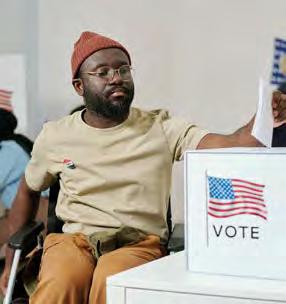
Tradeoffs eyed with closures
Minnesota plans to shutter several state treatment facilities for people struggling with addiction and shift dollars, staff and space to increasingly in-demand mental health programs.
But lawmakers and facility employees are pushing back against the closures, saying the state is trading one problem for another. They are particularly concerned with the looming shutdown of the only state-run substance use disorder residential facility specifically for women.
“Some of these women have been traumatized by men. They have been trafficked, neglected, abused,’ said Tarajee Goorhouse, a nurse at the Carlton facility. She said the women-only environment allows people "to feel safer, and able to be a little more vulnerable and focus on their recovery." Goorhouse and other employees picketed outside the Community Addiction Recovery Enterprise (CARE) facility in April and have been meeting with lawmakers in hopes of preventing its closure. The Carlton location is one of five 16-bed CARE centers around the state. The Department of Human Services (DHS) has been planning to close the Carlton, St. Peter and Willmar programs and continue operating the Anoka and Fergus Falls locations. The potential CARE closures are part of a complicated game of chess DHS is using to try to quickly tackle the state's mental health crisis with limited state budget dollars available this year.
The state's psychiatric treatment facilities and hospitals have lengthy waitlists and too few beds to meet the skyrocketing demand for mental health services. People who have nowhere else to turn are often stuck in emergency rooms and jails as they await treatment. Doctors, social service workers, sheriffs and family members of those in need have been pleading with the state to address the crisis.
So DHS has proposed shuttering the 16-bed CARE program in St. Peter and repurposing the space and staff. The location would instead serve people who have been civilly committed by the courts as “mentally ill and dangerous,” according to a DHS budget proposal detailing the shifts.
Patients who have that designation fill a number of coveted beds at Minnesota's largest psychiatric hospital, the Anoka-Metro Regional Treatment Center. By shifting people to St. Peter, DHS officials said the Anoka hospital could admit 50 to 75 more patients with mental illness each year. That change would come with new costs. If Minnesota closes the Carlton-based addiction recovery facility, which has struggled to retain staff and leases a building in need of repairs, it will save money that could be redirected to the new mental health services in St. Peter, DHS's budget plan says. Carlton employees would be offered positions at other state facilities.
The state decided last year to mothball the substance use disorder facility in Willmar, with services stopping June 30. DHS suggested that change could allow more staff to work at the Child and Adolescent Behavioral Health Hospital also located in the city and ensure that hospital is operating at full capacity.
There are no firm closure dates yet for the Carlton and St. Peter addiction programs, DHS officials said, but noted clients will be able to finish treatment before they are discharged.
(Source: Star Tribune)
REGIONAL NEWS
Disabled voters file suit in Wisconsin
Wisconsin voters with disabilities should be able to cast their ballots electronically and failure to provide that option for the upcoming Aug. 13 primary and November presidential election is discriminatory and unconstitutional, a lawsuit filed April 16 in the battleground state alleges.
The lawsuit seeks to require that electronic absentee voting be an option for people with disabilities, just as it is for military and overseas voters. Under current Wisconsin law, people with disabilities are “treated unequally and face real and considerable hurdles to participating in absentee voting,” the lawsuit argues.
Absentee ballots, including who can return them and where, have been a political flashpoint in swing state Wisconsin, where four of the past six
ADAPT active in Mankato
Representatives of Southern Minnesota ADAPT recently took their demands to the Blue Earth County Government Center during the first National Take Back Our Disability Rights Day.
Led by local ADAPT leader Chris Murphy, they met on the steps of the center and then went to the Human Services Office, handing their list of demands to Public Health Supervisor Erika Sletten, who represented Human Services Director Phil Claussen. They were there to help assure that rights earned through the Supreme Court's Olmstead decision 25 years ago were delivered.
While the Olmstead decision guarantees people with disabilities the right to receive supports and services in the community rather than in institutions, several realities prevent that, according to ADAPT.
Among their demands are living wages and benefits for personal care attendants and other caregivers, the end of institutional bias, the expansion of access to home and communitybased services, the construction of more accessible housing so people with disabilities can move out of institutions, and the delivery of durable medical equipment equitably and without fraud.
Denise Houston, who uses a wheelchair, said, “Give people a chance to live on their own because group homes are horrible.” She added the same is true for nursing homes.
Pastor Neil Ellingson of First Congregational United Church of Christ in Mankato has an 8-year-old son who qualifies for 23 hours a day of attendant care. Their family has never been able to utilize all of those hours.
“This hits really close to my and my family's situation,” he said. “There's so much to be grateful for in this state, but there's so much remaining left to go.”
ADAPT is a national grass-roots community that organizes disability rights activists to engage in nonviolent direct action, including civil disobedience, to assure the civil and human rights of people with disabilities to live in freedom.
(Source: Free Press of Mankato) Mental health concerns raised
It can be hard to predict what St. Paul Central High School principal Cherise Ayers will encounter when she walks through the doors each day.
“I would describe a day in the life of a principal as everything everywhere all at once,” Ayers said. “I am like the mayor of a small town. There are so many things happening, and Central is actually larger than some small towns.”
Principals like Ayers have an outsized impact on their schools. Research shows effective school leaders have a big impact on student achievement, teacher retention and other outcomes important for kids.
Many, though, are overwhelmed. A newly released University of Minnesota report on Minnesota K-12 school principals found school leaders struggling for traction on instructional leadership and community engagement as they deal with their single greatest challenge, student mental health.
“The principal really, really matters, and they're overwhelmed,” said Katie Pekel, executive director of educational leadership at the University of Minnesota.
The report from the U's College of
presidential elections have been decided by less than a percentage point. The Wisconsin Supreme Court is scheduled to hear arguments next month in a case seeking to overturn a previous ruling banning absentee ballot drop boxes.
A federal court sided with disability rights activists in 2022 and said the Voting Rights Act applies to Wisconsin voters who require assistance with mailing or delivering their absentee ballot because of a disability. The ruling overturned a Wisconsin Supreme Court ruling that said only the voter can return their ballot in person or place it in the mail.
The new case was filed against the Wisconsin Elections Commission in Dane County Circuit Court by four voters, Disability Rights Wisconsin and the League
Education and Human Development is based on a statewide survey of thousands of Minnesota principals conducted in November with a strong enough response that the college considers the findings conclusive.
Among those findings, 94 percent agreed that student mental health challenges are a significant barrier to student learning.
For Ayers, social media and technology are major contributors to the anxiety and emotional outbursts she sees students struggling with.
The effects are not limited to high school students. Emily Casselius, principal at Goodview Elementary in southeastern Minnesota, said she sees her students struggling with anxiety, depression and friend relationships, making it hard to focus on school work.
Over the last 12 months, another mountain of work has been added to the plates of school leaders: dozens of new laws from the Minnesota Legislature regarding things like reading instruction and non-exclusionary discipline.
Principals across the state voiced widespread concern that many of the mandates passed in 2023 were not fully funded or supported. Many reported needing more information and guidance to implement the changes as well as time to plan and train staff.
(Source: Minnesota Public Radio) College doors to open Minnesota college students with intellectual disabilities have often had to leave the state to find higher education options beyond schools that teach basic life skills. In 2019 students’ parents formed the Minnesota Inclusive Higher Education Consortium. The group’s efforts paid off in 2023 when the Minnesota Legislature allocated $2 million over two years for inclusive higher education, defined as equal access to higher education for students with an intellectual disability who need special education services.
Inclusive higher education calls for the students to have the same rights, privileges, experiences and outcomes as nondisabled students, for an experience resulting in a meaningful credential. That means access to the same fields of study, degree programs, housing options, campus activities and more.
Most of that money will go to colleges to fund new ways to boost enrollment for students with an intellectual disability. Some of the money — $500,000 — funds a technical assistance center operated by the consortium out of the University of Minnesota.
of Women Voters. Riley Vetterkind, a spokesperson for the elections commission, declined to comment on the lawsuit.
Voters with disabilities must have the ability to vote electronically in order for Wisconsin to comply with a variety of state and federal laws related to accommodation and equal-access, the lawsuit argues. Electronic voting will also ensure that people with disabilities are treated the same as other voters, the lawsuit contends.
The lawsuit states that because absentee voting for most in Wisconsin is by paper ballot, many people with disabilities are unable to cast their votes without assistance. They could vote in private if electronic voting were an option.
(Source: Associated Press)
The new center is the home where government, students, school leaders and other stakeholders in Minnesota can find expertise on best practices on providing postsecondary education for students with an intellectual disability.
There are nearly 200 colleges and universities in Minnesota. Of the four institutions with specific programs for students with an intellectual disability, three are designated as Comprehensive and Postsecondary Transition Programs by the U.S. Department of Education. That status allows the students to access federal financial aid. Those schools have a combined enrollment capacity of 90.
Studies show students with an intellectual disability who enroll in college are more than twice as likely to be employed than those who don't. They're also more likely to have higher wages, live independently and rely less on social services.
In May, Minnesota colleges will be able to apply for money to make higher education more accessible. They can receive up to $200,000 per year for four years.
The Minnesota Inclusive Higher Education Consortium is holding sessions to prepare colleges and universities to apply for the state grants, as well as the federal designation for financial aid.
(Source: Minnesota Public Radio)
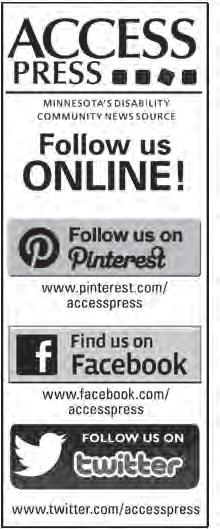
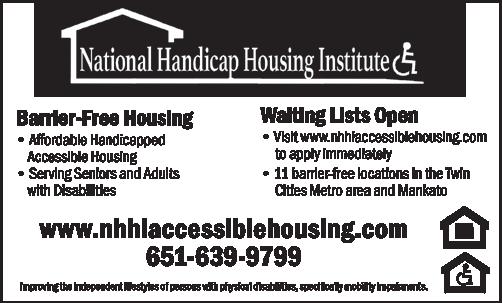
MAY 2024 Volume 35, Number 5 Pg 8
Be part of our Access Press Directory Next edition: July 2024 REGIONAL NEWS To page 9
DNR prepares to invest $35 million in many parks access features statewide
The Minnesota Department of Natural Resources (DNR) has plans to invest $35 million in Get Out MORE funds on wide-ranging access and accessibility improvements across the state.
The projects will focus on road, trail and facility modernizations in state parks, state forests and wildlife management areas
The DNR has identified more than 100 access and accessibility projects throughout the state as part of the once-in-a-generation Get Out MORE (Modernize Outdoor Recreation Experiences) investments approved by the Minnesota Legislature and signed by Gov. Tim Walz in 2023. The projects will serve new and existing users by making it easier to get to recreational opportunities, and easier for people to enjoy outdoor recreation.
The historic, one-time Get Out MORE investment of $149.9 million centers on five key areas:
Enhancing fisheries and fishing infrastructure ($60 million)
Enhancing access and welcoming new users to public lands and outdoor recreation facilities ($35.4 million)
Modernizing boating access ($35 million)
Restoring streams and modernizing waterrelated infrastructure to support outdoor recreation ($10 million)
Modernizing camping and related infrastructure ($9.5 million)
“Access and accessibility are vital to bringing new users to state parks, state forests and wildlife management areas to enjoy outdoor recreation and to improve the experiences of existing users,” DNR Commissioner Sarah Strommen said. “These investments show Minnesota’s commitment to ensuring people of all abilities and interests enjoy a world-class recreation system.”
The DNR manages 74 state parks and recreation areas, 60 state forests and more than 1,500 wildlife management areas that encompass nearly 5 million acres throughout the state.
Of the $149.9 million in Get Out MORE investments, $35.4 million will go toward enhancing access and accessibility. This will include $15 million for accessibility improvements in state parks and wildlife management areas at specific facilities.
Three comprehensive accessibility projects are planned at key state parks — William O’Brien, Sibley and Fort Snelling — and 11 smaller scale projects across the state. The
REGIONAL NEWS
From page 8
Insurance coverage is eyed
The share of Minnesotans without health insurance fell to an all-time low in 2023, according to data released by the Minnesota Department of Health.
Last year 3.8 percent of Minnesotans said they didn’t have any form of health insurance, down from 4.0 percent in 2021 and a high of 9.1 percent in 2009. The data comes from the Minnesota Health Access Survey, which interviewed 15,220 respondents between September and December 2023.
Minnesota has one of the nation’s lowest uninsurance rates, according to separate data from the U.S. Census.
“We are encouraged by Minnesota’s overall uninsurance rate,” Minnesota Commissioner of Health Dr. Brooke Cunningham said in a statement. “However, we must keep in mind these rates are dynamic. The state must remain committed to ensuring that Minnesotans eligible for public coverage have it available to them and that those who are no longer eligible for public coverage have affordable private options.”
The survey also found that the share of Minnesotans forgoing health care due to cost concerns rose from 2021 to 2023, likely reflecting the rollback of COVID-era stimulus money and coverage protections. About one quarter of respondents said they skipped needed care due to costs in 2023, up nearly 5 percentage points from 2021 but similar to the level seen in 2019.
Among those living at 200 percent or less of the federal poverty level, the rate was 33 percent, while 40 percent of indigenous Minnesotans said they skipped care due to cost. Among the uninsured the rate was 53 percent.
Gov. Tim Walz ran in 2018 on supporting a public health care option available to all Minnesotans. But Walz’ DFL party hasn’t been able to make it happen despite gaining narrow control of both legislative chambers in
comprehensive projects will involve improving accessibility of park amenities, bathrooms, and other facilities throughout the park, bringing greater accessibility park-wide.
More than 70 projects will focus on access improvements at wildlife management areas statewide, including building new accessible trailheads and ensuring existing hunting blinds, overlooks and trails are fully accessible.
Another $9.4 million is for road improvements. Road modernization will enhance more than 35 roads across Minnesota that provide access to recreational opportunities in state forests, wildlife management areas, state recreation areas, and state parks.
Projects in this category include bridge replacements, road reconstruction, erosion control and resurfacing. Improvements will make it easier for more people to reach and enjoy outdoor recreation opportunities.
Also, $8 million is earmarked for improvements to hiking and paved trails at state parks and hunter walking trails at wildlife management areas.
Projects include improvements at more than a dozen state parks to improve accessibility and long-term sustainability. Improvements will focus on increased access to hunter walking trails at wildlife management areas across the state.
There is $2 million for improved wayfinding and signage, to create or improve trailhead signage at priority wildlife management areas and hunter walking trail networks.
Additionally, the DNR will update maps for four state forests, including creating maps that users can download using various map apps and access even without cell service. These maps will include a high level of detail and highlight nearby recreation opportunities like trails and public water accesses as well as state forest amenities.
Wildlife management areas will receive improved signage and wayfinding at access points and hunter walking trails to increase function and accessibility for all users.
There will be $1 million for adaptive equipment, including track chairs and accessible hunting blinds, and supporting infrastructure. The funds will be used to purchase nine more track chairs and other items needed to support the track chair program, such as storage sheds and trailers.
Another need is for 65 pairs of specialized glasses. The glasses will assist visitors with redgreen color deficiencies, to see colors outdoors.
2023. Last month the governor’s office told the Reformer it wouldn’t happen in 2024, saying it was too expensive to pass in a non-budget year.
Still, Minnesotans’ rate of uninsured is minuscule compared to many states, especially those that have refused the Medicaid expansion that was part of the Affordable Care Act. In many Republican-controlled states, the rate is 10 percent or more. Texas has the nation’s highest uninsured rate, standing at 16.6 percent in 2022.
(Source: Minnesota Reformer)
Suicide awareness is raised
Dozens of veterans gathered April 15 at American Legion Post 167 in Willmar to listen to the American Legion’s National Commander Daniel Seehafer as he spoke about the continuing effort to end veteran suicide.
The visit from the national commander came as part of his tour of Minnesota which saw Seehafer visiting six posts across the state. The tour ended with Seehafer at the Capitol for Veterans Day on the Hill, a day of political activism for veterans as they push for issues
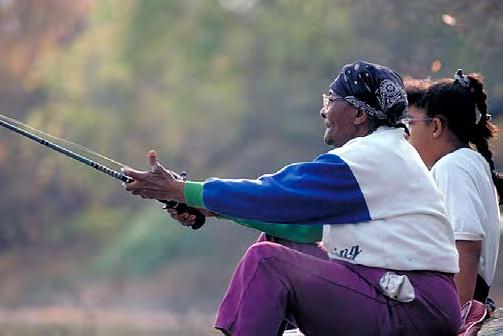

Adding kayaks and adaptive accessories is planned, as is the purchase of several mobile, fully accessible hunting stands for use during wildlife management area special and traditional hunts.
including property tax relief for disabled veterans and for veteran organizations.
While a push for statewide change was made April 17, what Seehafer spoke about in Willmar was change at an individual level. The American Legion's Be the One campaign asks people to step up and reach out to veterans who are facing adversity with their mental health.
“It is not just a campaign. It is a mission of ours, and it is a lifelong mission. We are not going to stop until the number of suicides is zero because losing one life is too many,” Seehafer said in an interview. "We want them to join our ranks, to be a part of us, to get back that passion. I have met soldiers with PTSD who have joined our family and told me ‘you know, the American Legion saved my life.’"
As part of the effort, Seehafer asked that local posts use what they have — whether it is baseball, oratorical competitions, a bar, charitable acts or something else. Whatever it is that makes the post unique can be used to give a place for veterans to find a family.
According to the 2023 National Veteran
Travel with True Friends!
More than 20 destinations in 2024, including: Country Jam USA Magic of Disney Ultimate NASCAR Wisconsin Dells Tanque Verde Ranch Royal Caribbean Cruise And many more!


As further details are available about these projects, information will be added to the Get Out MORE webpage of the DNR website (mndnr.gov/aboutdnr/get-out-more)
Suicide Prevention Annual Report by the U.S. Department of Veterans Affairs, the suicide rate for veterans in 2001 was 23.3 per 100,000. In 2021, it was 33.9 per 100,000. The 2021 rate was almost double the rate for nonveteran adults.
Be the One was started prior to Seehafer’s election as national commander; he has continued the work due its importance.
During his address, Seehafer commented on the many stories he has heard from veterans across the country who have contemplated suicide.
The American Legion is hoping to provide veterans with the community they need to tackle those issues.
(Source: West Central Tribune)


•
MAY 2024 Volume 35, Number 5 Pg 9
800-649-5215 651-399-3075 Learn more at amramp.com
For your FREE estimate, call
at a time.
Changing our customers’s lives, one ramp
Low cost
evaluations
Rent or buy • Installed in days “It is important that our clients who struggle with stairs are able to maintain their freedom, dependence and community ties.”
• FREE home
•
Check out our Travel Catalog to plan your adventure: www.truefriends.org/travel
DNR
Many people enjoy fishing at state parks.
Sibley State Park has beautiful natural areas.

Something new at Radio Talking Book
The State Services for the Blind website has new updates, including posting the Radio News online each month with links to the audio promos for each book. Find the updated pages here: mn.gov/deed/ssb/radio
Radio Talking Book is not just for listeners with visual disabilities. Anyone with difficulty reading or turning pages can enjoy the service. The service has 19 new books on this month.
Hear programming on a hand-held mobile device, for either iOS or Android. Visit the Apple App Store for iOS, or Google Play for Android, and download the Minnesota Radio Talking Book app.
The sampling published monthly in Access Press doesn’t represent the full array of programming. Listen to RTB’s live or archived programs online at www.mnssb. org/rtb, and learn more about programs.
Missed a book broadcast? Access it for one week following its original broadcast in the online weekly program archive.
For help accessing the archive, contact Ronnie Washington at 651-539-1424 or SSB. Equipment@state.mn.us
If the book’s broadcast is no longer available in the archive, contact staff librarian Dan Gausman at 651-539-1422 or dan. gausman@state.mn.us.
Books broadcast on the Minnesota Radio
Talking Book Network are available for loan through the Minnesota Braille and Talking Book Library in Faribault. The catalog is at www.mnbtbl.org. Click on the link Search the Library Catalog. Call the Minnesota Braille and Talking Book Library at 800-722-0550, Mon-Fri, 9 am - 4 pm CST.
For updates, go to the Facebook site Minnesota Radio Talking Book.
Audio information about the daily book listings is on the National Federation for the Blind (NFB) Newsline. Register for NFB Newsline by calling 651-539-1424. The NFBNEWSLINE service provides access to more than 500 magazines and newspapers. To learn more, visit www.nfb.org/programsservices/nfb-newsline; 612-5627803
Comments about current books that could be broadcast or any other programming issues? Contact Joseph Papke at 651-5392316 or joseph.papke@state.mn.us
Chautauqua*
Monday – Friday 6 a.m.
The Deepest Map, nonfiction by Laura Trethewey, 2023. The dramatic story of the last mysterious place on earth—the world’s seafloor—and the marine biologists, entrepreneurs, and adventurers involved in the historic push to chart it. Read by Julia Brown. 11 broadcasts; begins Mon, May 13
Where We Meet the World, nonfiction by Ashley Ward, 2023. The thrilling story of how our senses evolved and how they shape our encounters with the world. Read by Karen Ray. 14 broadcasts; begins Tue, May 28.
Past is Prologue*
Monday – Friday 11 a.m.
When Winter Came, nonfiction by Mary Beth Sartor Obermeyer, 2023. A country doctor's journey to fight the flu pandemic of 1918 in Iowa. Read by Bonnie Swenby. 10 broadcasts; begins Mon, May 13.
Wilhelm's Way, nonfiction by Teresa Wilhelm Waldof, 2022. The untold story of the humble man whose scientific innovation helped end World War II. Read by Andrea Bell. 12 broadcasts; begins Mon, May 27.
Bookworm*
Monday – Friday 12 p.m.
The End of Drum-Time, f iction by Hanna Pylväinen, 2023. An epic love story about a young reindeer herder and a minister’s daughter in the nineteenth century Arctic Circle. Read by Jeffrey Weihe. 15 broadcasts; begins Mon, May 13.
The Writer’s
Voice*Monday – Friday 1 p.m.
The Book of Charlie, nonfiction by David Von Drehle, 2023. One of our nation’s most prominent writers discovers the truth about how to live a long and happy life from the centenarian next door in this original and highly readable account of a splendid American life. Read by Bonnie Swenby. Seven broadcasts; begins Thu, May 9.
Farewell Transmission, nonfiction by Will McGrath, 2022. Memoir essays about the concealed lives we encounter every day, and the hidden worlds that exist within our own. Read by Jim Ahrens. Six broadcasts; begins Mon, May 20.
Quietly Hostile, nonfiction by Samantha Irby, 2023. A hilarious new essay collection with a combination of laugh-out-loud moments, heartfelt passages, and plenty of awkward experiences. Read by Dan Sadoff. 10 broadcasts; begins Tue, May 28. – L, S. Choice Reading*
Monday – Friday 2 p.m.
Small World, fiction by Laura Zigman, 2023. A heartfelt novel about two offbeat and newly divorced sisters who move in together as adults—and finally reckon with their childhood. Read by Lisa Bromer. Nine broadcasts; begins Wed, May 15. – L
A Council of Dolls, fiction by Mona Susan Power, 2023. A profoundly moving novel spanning three generations of Yanktonai Dakota women from the 19th century to the present day. Read by Pat Muir. 12 broadcasts; begins Tue, May 28.
Afternoon Report*
Monday – Friday 4 p.m.
The Crisis of Democratic Capitalism, nonfiction by Martin Wolf, 2023. A magnificent reckoning with how and why the marriage between democracy and capitalism is coming undone, and what can be done to reverse this terrifying dynamic. Read by Anna Pliner. 14 broadcasts; begins Tue, May 14.
Night Journey*
Monday – Friday 7 p.m.
Lowdown Road, f iction by Scott Von Doviak, 2023. A heart-racing road trip across 1970s America as two cousins make the heist of their lives and must avoid the cops and criminals hot on their tails. Read by John Gunter. Nine broadcasts; begins Mon, May 27. – L
Off the Shelf*
Monday – Friday 8 p.m.
In Memoriam, fiction by Alice Winn, 2023. A haunting, virtuosic debut novel about two young men who fall in love during World War I. Read by Holland Richner. 15 broadcasts; begins Mon, May 13. – L, S, V, G
Potpourri*
Monday – Friday 9 p.m.
The History of Sketch Comedy, nonfiction by Keegan-Michael Key & Elle Key, 2023. A detailed journey through the art and craft
GOLD ($500-$999)
BENEFACTOR ($1000 & up)
Janice Chevrette
Jane Larson
Ronna Linroth
Brandon Miller
Lynda Milne
Ann and Larry Roscoe
Walter Siebert
Joel Ulland
Kay Willshire
Tamarack Habilitation Tech, Inc.
Sarah Berg
Jesse Bethke-Gomez Jean
of humor from a master comedian. Read by Stevie Ray. Nine broadcasts; begins Thu, May 23.
Good Night Owl*
Monday – Friday 10 p.m.
Godzilla and Godzilla Raids Again. fiction by Shigeru Kayama, 2023. The first English translations of the original 1955 novellas about the iconic kaijū, Godzilla. Read by Gary Rodgers. Nine broadcasts; begins Tue, May 21.
RTB After Hours*
Monday – Friday 11 p.m.
Georgie, All Along (rebroadcast), fiction by Kate Clayborn, 2023. A wise and witty novel that echoes with timely questions about love, career, reconciling with the past, and finding your path while knowing your true worth. Read by Carol McPherson. 14 broadcasts; begins Wed, May 8. – L, S Native Love Jams, fiction by Tashia Hart, 2023. A Minnesota Book Award finalist romance set in a Native American community. Read by MaryBeth Redmond. Four broadcasts; begins Tue, May 28. – L, S Weekend Program Books
Your Personal World, 1 p.m. Sat, presents Life is Hard by Kieran Setiya, read by Parichay Rudina.
For the Younger Set, 11 a.m. Sun, presents The Complicated Calculus (and Cows) of Carl Paulsen by Gary Eldon Peter, read by Lynn Middleton-Koller. – L; followed by First-Year Orientation, edited by Lauren Gibaldi and Eric Smith, read by MaryBeth Redmond. – L.
Poetic Reflections, noon Sun, presents The Best American Poetry 2023 edited by David Lehman and Elaine Equi, read by Jim Ahrens. – L. The Great North, 4 p.m. Sun, presents Confluence: A History of Fort Snelling by Hampton Smith, read by Yelva Lynfield.
Nora Aileen Beall
Joanna & Richard Cortright
Nancy N. Eustis
Thomas Fogarty
Give Lively Foundation
Maren Hulden
Catherine Hunter
Dale Janiszeski
Barb Kane
Kim Keprios
Burl Gilyard
Ann Griffith
Jeff Bangsberg & Anita Boucher
Anne L. Henry
Kim Kang
Steve Kuntz
Alexandra Bartolic
Dena Belisle
Tim S. Benjamin
Gretchen Bratvold
John & Marilyn Clark
Tom Clark
Mark Daly
Yoshiko S. Dart
Anonymous
Rosebud Elijah
Joel Enders
Brandon Miller
Jim Musselman
Debra J. Shriver
Robyn Wade
Courage Kenny
SILVER ($150-$499)
Robert Gregory
Craig Dunn & Candy Hart
Pam Hochrein
Judy Hunt
Rick & Susie MacPherson
Brian Musselman
Manley Olson
Mark W. Traynor & Jen Peterson
Julee Quarve-Peterson
Hilary and Stuart Ratner
Lee Ann & Dale Erickson
Laura Fedock
Kent Fordyce
Vicki Garrets
BRONZE ($75-$149)
Megan Keyser
Sue Kohler
Steve Larson
Michelle & John LeBlanc
Gene Martinez
John Marty
Tom & Kay Milne
Eric S. Nelson
Daniel Ness
Annette M. Pantel
Mark Payette
Reach for Resources
Ken Rodgers
Linda Wolford
Amanda & Mark Tempel
Hammer Residences, Inc.
Laurie Sack
Carrie Salberg
Anita & Luther Schermer/Granquist
Stephanie Schwartz
Jon Skaalen
Laurene Tomaszewski
Lisa Vala
Cathy Wick
Zekerya Yargici
Leslie Zaricor
Richard Ziton FRIEND ($50-$74)
Sandy Lane
Kenneth Latkin
Shelley Madore
William & Joan Overby
Sonja Peterson
Mike Schwartzbauer


Gwendolyn Short
Diane Sprague

MAY 2024 Volume 35, Number 5 Pg 10
RADIO TALKING BOOK All times listed are Central Standard Time. Abbreviations V – violent content R –racial epithets L – strong language S –sexual situation G – gory descriptions
Mail your donation to: Access Press, LTD. PO Box 40006, Industrial Station, St. Paul, MN 55104-8006 DATE: AMT. ENCLOSED $ NAME ADDRESS CITY/STATE/ZIP PHONE EMAIL SUPPORT ACCESS PRESS* Friend $50+ Bronze $75+ Silver $150+ Gold $500+
Benefactor
$1000
Christy
Cloud
Cross
Ness
R. Doering
Doering
J. Emanuel
& JoAnn Erbes
Erickson
Lael Gatewood
Terry Hagenah Hammer Residences
& Skip Houghton
Richard
Margot
Daniel
Dawn
Dean
Anonymous Ellen
Steve
Dale
Claudia Fuglie
Marjorie Goldberg Mike Gude
Ellen
Paul Bauer & Pat Cretilli
Phil Jacobsma Laura Johnson Mark Knutson Tag Krogseng
Andrea McKee
Twyla M. Misselhorn
Debra Norgaard
Annette M. Pantel
Donn Poll
Alina Schroeder
Katherine Tomlinson
to ALL OF YOU for supporting Access Press
Dick VanWagner Katheryn J. Ware Thanks

The Art of We
The Art of We: Are Still Celebrating, Upstream Arts’ Annual Community Celebration and Fundraiser, is 6-9 p.m. Tue, May 21 at Luminary Art Center, Mpls., or online. The free annual celebration honors the community of program participants, partners, artists, and supporters to celebrate another year of work at the intersection of art, disability, and learning. Sponsors are still needed. Preregister. FFI: https://www.upstreamarts.org/
Open Flow Forum
The Artists with Disabilities Alliance meets via Zoom 7-9 p.m. May 2 and June 6. Virtually join artists with disabilities and supporters to share visual art, writing, music, theater and artistic efforts or disability issues. Facilitators are Tara Innmon and Andy Sturdevant from Springboard for the Arts. Anyone needing accommodations including ASL interpreting or captioning contact Andy Sturdevant. Funding available for access needs. FFI: 651294-0907, resources@springboardforthearts. org, openflowmn@gmail.com
Making arts accessible
Several workshops in May and June will offer different ways of making the arts more accessible to people with disabilities. The workshops are offered by the Minnesota Association of Community Theatres. Sat, May 18 at Northern Starz Theatre, Ramsey. Including People with Disabilities in Your Shows is 10 a.m.-noon, followed by a networking lunch and a session at 1:303:30 p.m. on What is the Penguin Project and Could It Be Part of Your Season. The session is on musicals that include youth with and without disabilities.
Audio Describer Training is 9 a.m.-5 p.m. Thu/Fri, May 16-17, at Theatre in the Round, Mpls, and Sat/Sun, May 18-19, at Minnesota Fringe office, Mpls. Attend one of the two-

Volunteer
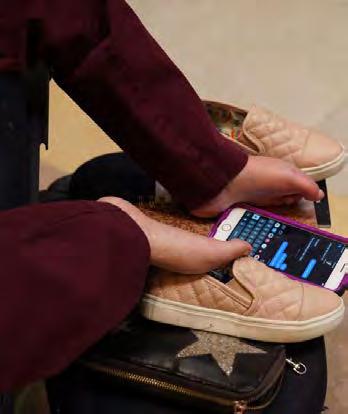
day trainings and learn the skills to describe the visual aspects of shows for people with vision loss.
Captioning options available to serve audience members with hearing loss is offered 10 a.m.-2 p.m. Sat, June 1 at Artistry, Bloomington Additional workshops will be held on Saturdays in June. Preregister. Learn about registration fees at https://mn-act.net/ FFI: Jon, 612-819-0949.
Resources to Enjoy!
The Enjoy! listings are for arts events as well as banquets, fundraisers, walks and other fun events by and for disability
OPPORTUNITIES
Speak for nursing home residents
Long-term care volunteers bring passion and value to their work in nursing care facilities across Minnesota. With training and direction from the Office of the State Ombudsman for Long-Term Care, volunteers champion the office’s mission to empower, educate and advocate for the rights of Minnesotans receiving long-term care services and supports.
Certified volunteers assist paid regional ombudsmen to investigate and advocate for residents in nursing homes and assisted living settings. Residents are often unable, uncomfortable or, in some cases, fearful to advocate for themselves. With a resident’s consent, volunteers assist regional ombudsmen responding to residents’ concerns through complaint investigations.
The state is looking for volunteers who are passionate about serving people in longterm care.
There are more than 2,500 nursing homes and assisted living facilities across Minnesota. Fewer than 50 of those facilities currently have a certified ombudsman volunteer. The difference a volunteer makes in the lives of long-term care residents is immeasurable.
The greatest volunteer needs are in Alexandria, Breckenridge, Chatfield, Dawson, Detroit Lakes, Duluth area, Eveleth, Fergus Falls, Faribault, Grand Rapids, Hastings, International Falls, Luverne, Madison, Moorhead, Northfield, Owatonna, Red Wing, Silver Bay, Spring Valley, Two Harbors, Virginia, Wabasso, Waseca, Wheaton, Willmar, Winona and Worthington
Anyone interested in becoming a volunteer can visit https://mn.gov/ooltc/ volunteerwithus for more information.
To contact the Office of Ombudsman for Long-Term Care with any residents’ rights concerns, visit https://mn.gov/ ooltc/contactus/. The office provides free, confidential advocacy services.
Open House
Visit Can Do Canines
Can Do Canines hosts an open house noon-2 p.m. Sat, May 18 at its campus at 9440 Science Center Drive, New Hope. Potential clients, volunteers or anyone who might be interested in supporting the organization is invited to attend to learn how an assistance dog changes the life of a
Weigh in on centers for independent living plan
One of the great resources for Minnesotans with disabilities is the centers for independent living. The centers, known as CILs, are throughout the state.
Now is a chance to weigh in on what the centers are doing, and how they can serve Minnesota’s disability community. The Minnesota Statewide Independent Living Council’s proposed three-year State Plan for Independent Living is open for comment.
The council, known as MNSILC, is required to submit a State Plan for Independent Living every three years to the Department of Health and Human Services, Administration for Community Living. The plan outlines Minnesota’s vision, goals and objectives for our state’s independent living network for federal program years 2024-2027. As required by federal law, the goals for the 2024-2027 State Plan are open for a public comment period, closing on Wednesday, May 29.
The proposed plan and a short summary will be available on the home tab of the MNSILC website. The proposed plan is available in alternative languages upon request.
Minnesotans with disabilities and their support staff, family members and allies are urged to weigh in. This is also a great opportunity to become familiar with what the centers do, and what their plans are for the future. Anyone wishing to provide comments on the proposed plan can email mnsilc1215@gmail.com or call 612-581-1497.
Remember, any comments you make will be public. That means may be shared in future publications or communications related to independent living planning.
CILs need support and input to be successful.
The state plan will be used to lay out future activities and in planning for funding. That’s why it’s important for people to weigh in, especially people from Greater Minnesota.
Anyone with questions about the draft 2024-2027 State Plan for Independent Living or the public comment process should contact Deborah Gleason, MNSILC chair, mnsilc. chair@gmail.com or Jo Erbes, MNSILC Coordinator, mnsilc1215@gmail.com.
services organizations. Schedules may be subject to change, so check with a venue or organization before making plans. Arrange for disability accommodations well in advance at any event.
Disability service organizations typically send e-news blasts and have social media. Both are other ways to find out about events. The Minnesota Access Alliance (MNAA) provides an Accessible Arts & Culture Calendar for arts patrons who use accessibility accommodations such as audio description, captioning, ASL interpreting and sensory-friendly accommodations. Link to more details at https://calendar.mnaccess.
org. Be sure to check the listing or venue to find out any COVID-19 protocols and if an advance reservation is needed for an accessibility service.
Accessible events can be submitted to the MNAA Calendar (and MinnesotaPlaylist.com) To receive a free monthly events calendar, email mactfactor@icloud.com and/or info@ mnaccess.org. Ask for the entire events list or specific lists for ASL interpreting, captioning, audio description, sensory-friendly accommodations or disability-related topics. For other accessibility resources or upcoming webinars presented by MNAA, sign up for emails at https://mnaccess.org
person with a disability. Through a self-guided tour, attendees will be able to watch a trainer working with an assistance dog, talk with a dog host volunteer and staff members from the volunteer department, pose questions to client services coordinators, and meet graduate teams from five types that Can Do Canines trains dogs: hearing, mobility, seizure, diabetes and childhood autism. To request a sign language interpreter for the open house, please contact Laurie at lcarlson@candocanines.org or 763-331-3000 at least two weeks in advance. FFI: www. candocanines.org
Children and families
PACER workshops sampling
PACER Center offers many useful free or low-cost workshops and other resources for families of children with any disabilities. Some in-person workshops are offered at PACER Center, at Greater Minnesota locations and also offered online. Other workshops are online and livestreamed at this time. Advance registration is required for all workshops. At least 48 hours’ notice is needed for interpretation. Check out PACER’s website and link to the newsletter of statewide workshops that allows participants to pick and choose sessions designed for their needs. Access Press only lists a sampling of the workshops offered.
Tech for Teens Club: 3D Printed Lightsaber is 10-11 a.m. Sat, May 4 at PACER Center. May the 4th be with you! Learn how to use a 3D printer and design software to design and print a lightsaber. Then, create a circuit to make the lightsaber light up.
Making the Move: Your Child’s Transition from Early Childhood Special Education to Kindergarten is 6:30-8 p.m. Tue, May 7. Online. Kindergarten is a big step in any child’s life. Parents of young children with disabilities will receive information to plan for this transition and learn strategies to help their child be successful.
Tools to Support Meal Planning and Cooking is 1-2 p.m. Wed, May 8. Online. Learn about apps and devices for meal planning, cooking instructions and cooking tools to help adults with disabilities to live more independently.
Think It, Dream It, Do It: Post-High School Options for Students with IDD: Community-based Employment Stories is 6:30-8 p.m. Thu, May 9 for first session. Online. In session one of a series, learn from a panel of young adults and their families
about their journeys to community-based employment. Presented with Larissa Beck, Director of Community Living Supports with Reach for Resources, and Brian Begin from the University of Minnesota’s Institute on Community Integration.
The second session is 6:30-8 p.m. Tue, May 21. Online. Learn about national higher education resources and opportunities that are continuing to expand in Minnesota. Presented with Dan Habib from Think College, Mary Hauff with the Minnesota Inclusive Higher Education Consortium, Dawn Allen, Director of Bethel Build, and a panel of young adults and their families.
Living, Learning, and Working After High School is 9 a.m.-2 p.m. at PACER Center. Join PACER for a mini-conference on transition to adulthood. Minnesota parents of young adults with disabilities are invited to hear from community experts and PACER transition specialists on a variety of topics. Sessions include changes when youth turn 18, supported decision-making and other alternatives to guardianship, preparing for postsecondary, and how schools and vocational rehabilitation services support a youth’s employment goals.
Creating a Crisis Plan for Youth With Mental Health Needs is noon-1 p.m. Wed, May 22. Online. The workshop will provide an opportunity to work through an example
crisis plan and provide suggestions on how a crisis plan can be used for positive support at home or in school, and with 504 Plans and IEPs. FFI: PACER, 952-838-9000, 800537-2237, www.pacer.org
Info & Assistance
Many classes available NAMI Minnesota (National Alliance on Mental Illness) has set up a wide variety of free and in-person online mental health classes. Choices include Hope for Recovery, Transitions, Ending the Silence, Understanding Early Episode Psychosis for Families, In Our Own Voice, Family to Family, Positive Psychology, Creating Caring Communities, smoking cessation, a suicide prevention class called QPR – Question, Persuade and Refer, a special QPR class for Agricultural Communities and many more. NAMI Minnesota’s Online Support Groups have moved to HeyPeers. HeyPeers provides a safe, easy to access environment exclusively designed for online support group meetings.
The classes and online support groups are designed for family members and caregivers, persons living with a mental illness, service providers, and also the general public. Find a complete listing of these classes and how to join in by going to namimn.org and clicking on “Classes” FFI: namimn.org
CLASSIFIEDS FOR RENT

MAY 2024 Volume 35, Number 5 Pg 11
ENJOY !
METES & BOUNDS MANAGEMENT Company manages the following Section 8 & Section 42 (Tax Credit) properties in Minnesota. Income and rent restrictions apply. Section 8 Boardwalk Wayzata 952-473-0502 Dewey Place/The Pines Foley 320-968-7791 Greenwood Wadena 218-631-2575 Highwood Homes Prior Lake 952-447-6961 Linderhof Park New Ulm 507-354-5964 Mission Oaks Plymouth 763-559-5770 Rustic Creek Two Harbors 218-595-1018 Todd 27 Long Prairie 320-732-6154 Town Square East Grand Forks 218-773-3631 Victory Duluth 218-722-2629 Section 42 (Tax Credit) Abbott Apartments Mpls 612-338-5588 Crosby Country Crosby 218-546-8400 Eastwood Village Oakdale 651-773-1949 Nature's Edge St. Cloud 320-203-7726 Parkside Rochester 507-281-9003 Valley High Rochester 507-536-4797 Valley View Byron 507-775-2821 Metes & Bounds is an equal housing opportunity housing company FIND YOUR NEW HOME WITH AT HOME APARTMENTS Call 651-224-1234 or visit AtHomeApartments.com for an apartment or town home Equal Opportunity Housing Classified rates: $20 (first 12 words); $1/word beyond 12. Deadline:
of each month.
will email total cost of classified ad. Email your classified to access@accesspress.org
20th
We


























































